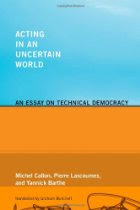
Last month Clay Spinuzzi wrote a review of Acting in an Uncertain World which inspired me to read the book myself. I was not disappointed. I've done lots of thinking beyond the book, much like I've begun to do with The Great Reset. Before sharing those thoughts in a later post, I first want to reveal how I found Acting in an Uncertain World to be valuable. One way I enjoy reflecting on books that I've read is to ponder what questions of mine were answered indirectly by the authors. Reading helps me realize what open questions I'm carrying by offering me wonderful insights, perspectives and patterns that respond to them. Here's a few of the questions that Michel Callon, Pierre Lascoumes and Yannick Barthe have helped me answer:
Why do scientists in the public interest go into seclusion when working on high profile problems?
My question arises from the pattern of building trust in our expertise, advice and solutions by revealing our process of coming up with what we want trusted. In other post, Clay Spinuzzi both preached and practiced this pattern. Along the same lines, I faulted the authors The Firm as a Collaborative Community of for their conspicuous absence of transparency. I expect scientists in the public interest to be visible to the public as they contributed to problem formulations, data gathering, hypothesis testing and empirical validation. I learned several reasons why scientists favor opaqueness and seclusion from Acting in an Uncertain World:
- The data in the world is too contaminated or impure to support precision in research findings.
- The reductionistic process of scientific endeavors does not satisfy the hunger for immediate explanations among the public in a panic
- The public appears irrational and unapproachable to scientists, in spite of concerned scientists wanting to serve the public's needs and solve their problems
- Scientists are under constant scrutiny from peers to justify their hypotheses, validate their methods and verify their findings
- Scientists develop symmetric relations with their own colleagues, but asymmetric power over politicians, spokespersons and representatives for the concerned public.
Why do concerned citizens experience so much difficulty getting heard when problems of public concern affect them personally?
Elected representatives now have staff who monitor emails, tweets and blogs for relevant mentions, concerns and commentary. Journalists are seeking lesser known and low profile sources for insider perspectives close to the alarming problems. The concerned citizens can upload text, photos, podcasts, slides and videos in order to get visibility, credibility and understanding. I've been expecting the problem of "not getting heard" to have faded away by now. Acting in an Uncertain World gives us several explanations for the continuing problem of concerned citizens getting silenced, shot down and misunderstood:
- Most citizens can only recite their victim story, but not retell their misfortune in a larger or more abstract context of concepts, patterns and well-defined problems
- Concerned citizens often dwell on the issue, but neglect the cultivation of their reputation, credibility and identity as a legitimate voice
- Citizens abdicate their voices by over-relying on representatives and professional scientists who both prefer their silence through an implicit process of "double delegation"
- Citizens lack support systems and transition processes for entering public forums, contributing to debates or reframing contentious issues as shared interests
- Most concerned citizens don't reciprocate the scientists' interest in public concerns with their own symmetrical interest in scientific concerns which would establish them as compatible "researchers in the wild" capable of authentic dialogue
How have democratic processes effectively addressed problems with backlash, spill-over, residue, fallout and other forms of unintended consequences?
Journalists seem to dwell on what's not working in our world. We get too much information about crises, incompetence and stalemates. We hear too little about effective approaches, competent individuals and effective collaborations. So this question arises from what missing in our biased news diet. Acting in an Uncertain World gives us some models which have proved effective in these situations of alarming public concern:
- A migration from delegative to dialogic democracy involves those people closest to the problem to contribute to problem formulation, gathering of useful sample data, or anticipation of consequences from remedial actions
- The cultivation of roles for "researchers in the wild" validates the perspectives and motivations of concerned citizens while framing their conversations in terms useful to scientists and legislators
- The structured use of models for opinion gathering, consensus building and conflict resolution increase the quantity and quality of participation among citizens
- The shared map of translations -- from the messy world to the secluded laboratories (1) to precise findings (2) to the solutions applied in the world (3) -- creates an expansive space for addressing public concerns productively
To get questions to such large questions as these says to me that this book is unusually useful. That it also provoked many deeper reflections for future posts reinforces my impression of the authors' successful value proposition.
No comments:
Post a Comment